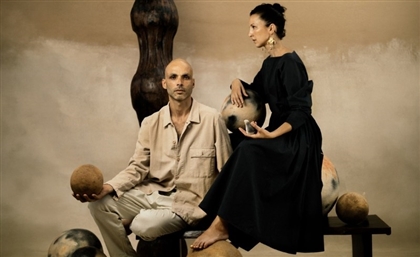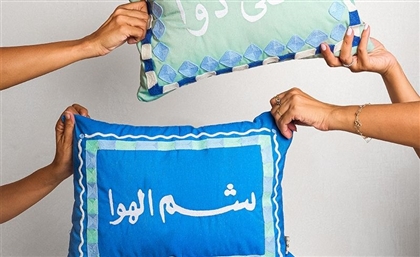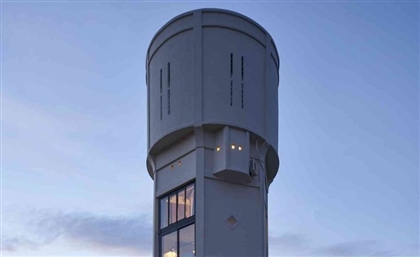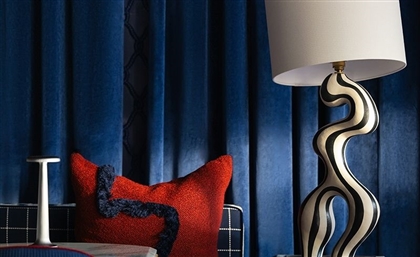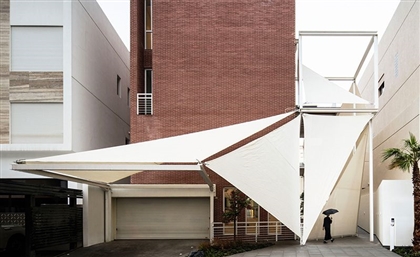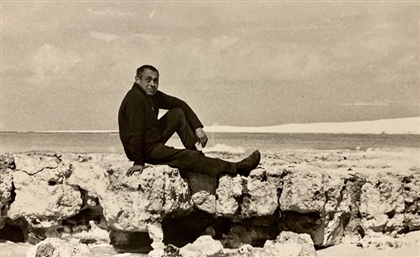Indulge In These Arabesque Home Accessories by Naia Design House
Noha Ali, a Swiss-Egyptian product designer, managed to subtly carve traditional arabesque patterns on modern home accessories that were put on display at the Egyptian Pavilion in Expo 2020.
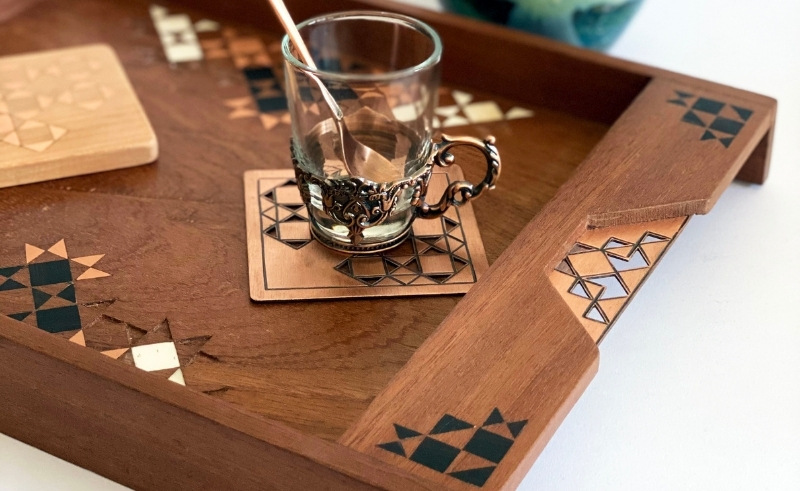
Giving artisanal flair to modern designs is a feat most designers strive for, and nothing says ‘artisanal’ more than arabesque patterns. Noha Ali, a Swiss-Egyptian product designer, demonstrates through her studio, Naia Design House, how traditional arabesque patterns can be subtly styled on modern home accessories that range from tables and jewelry boxes, to trays with dreamy mother of pearl inlays, without losing their heritage touch. Which led to their displays at Bayt Al-Razzaz Palace during Prince Charles’ recent visit to Egypt in November and the Egyptian Pavilion at Expo 2020.
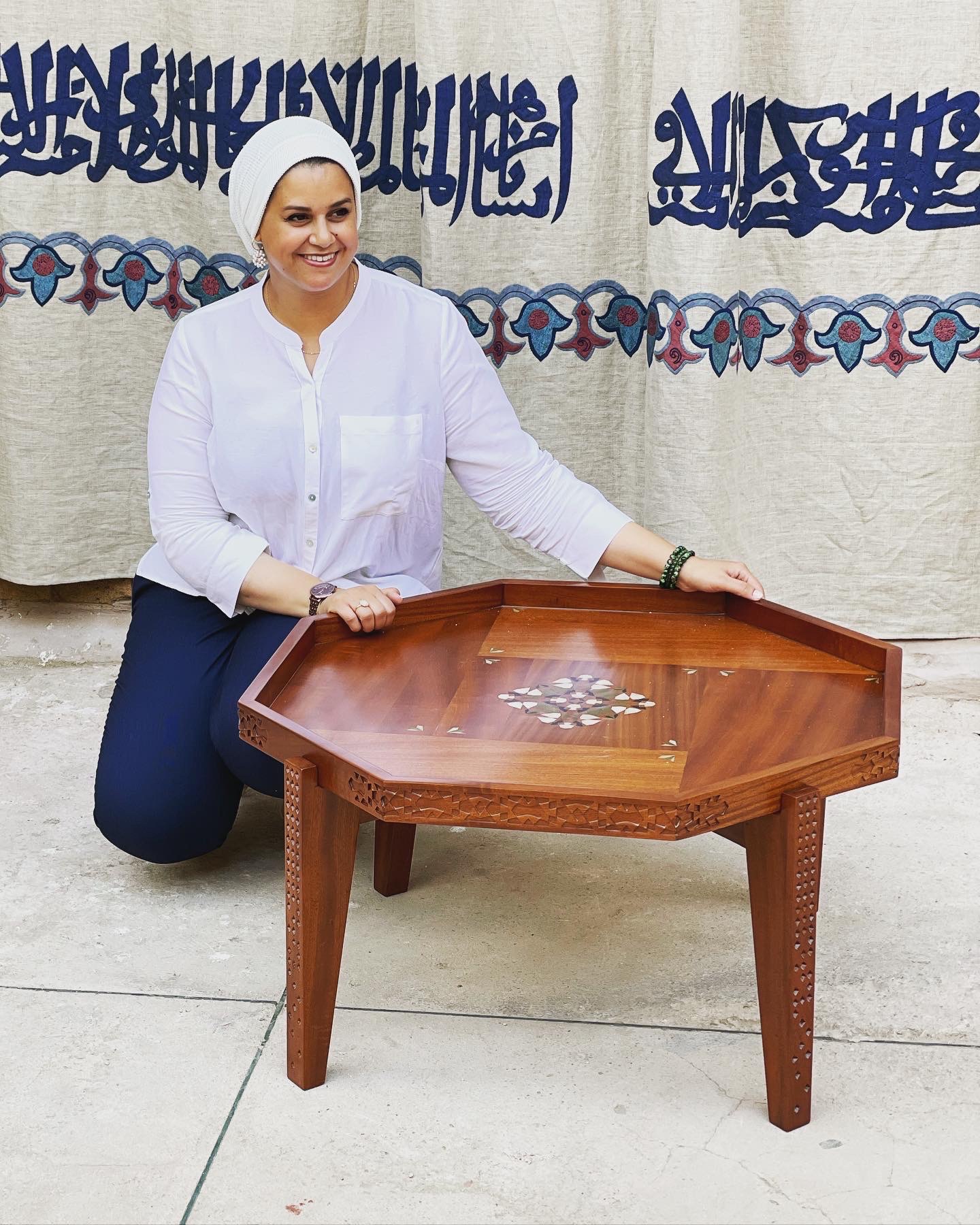
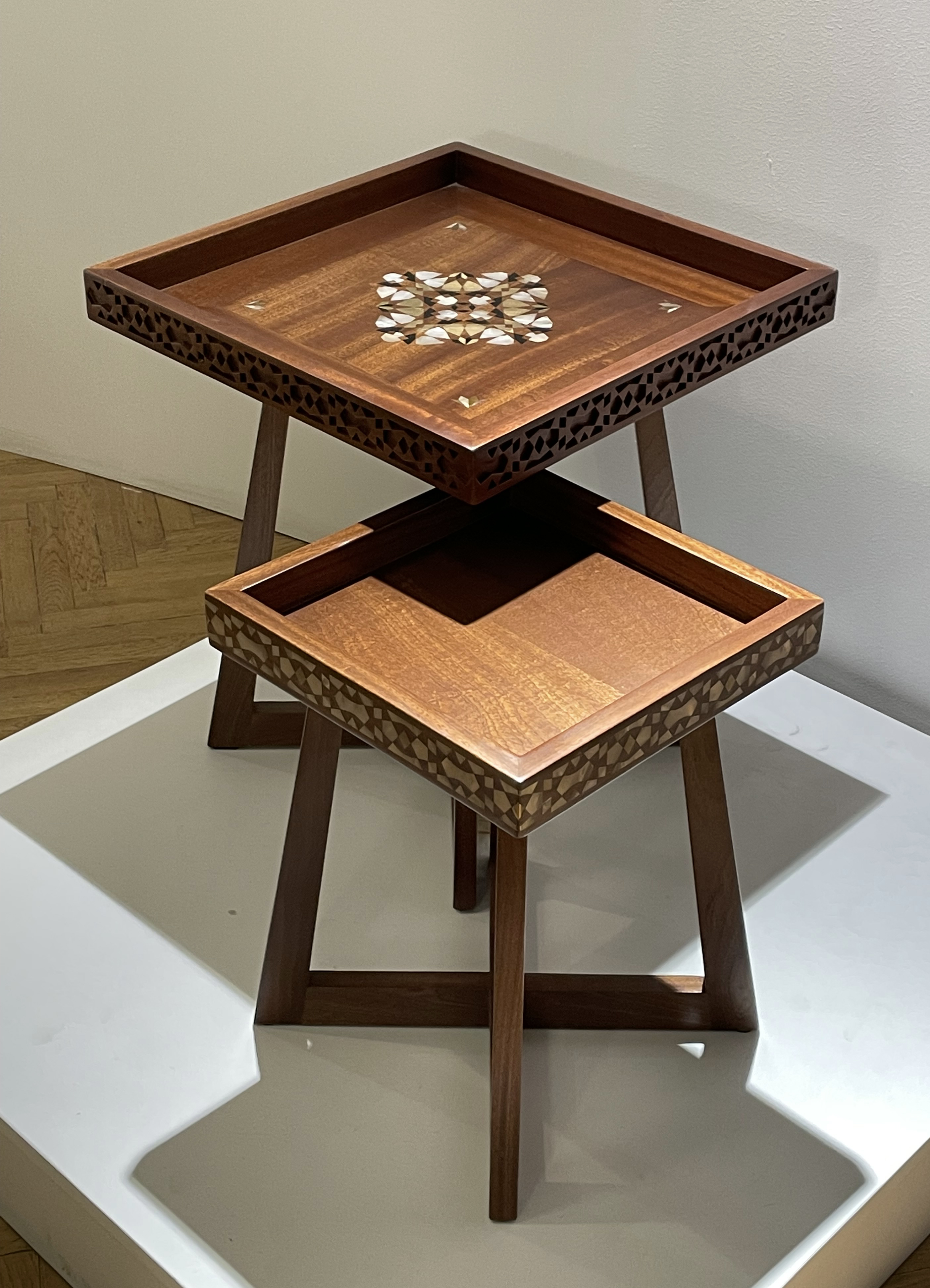 Inspired by the pulpit in Qijmas Al-Ishaqi mosque in Old Cairo, Ali crafted the Qijmas side tables in two variants, a heavily ornate design was displayed at Bayt Al-Razzaz while a second more abstract variant went to Mahally with Mona Hussein, where their products are exclusively sold. “They proved that even if our work is inspired by heritage, it still fits contemporary lifestyles.” Ali managed to adapt the designs by picking up the craft from its roots, which makes their products easy on the eye. Even when intricate patterns and inlays are applied to the tiniest of home accessories; coasters.
Inspired by the pulpit in Qijmas Al-Ishaqi mosque in Old Cairo, Ali crafted the Qijmas side tables in two variants, a heavily ornate design was displayed at Bayt Al-Razzaz while a second more abstract variant went to Mahally with Mona Hussein, where their products are exclusively sold. “They proved that even if our work is inspired by heritage, it still fits contemporary lifestyles.” Ali managed to adapt the designs by picking up the craft from its roots, which makes their products easy on the eye. Even when intricate patterns and inlays are applied to the tiniest of home accessories; coasters.
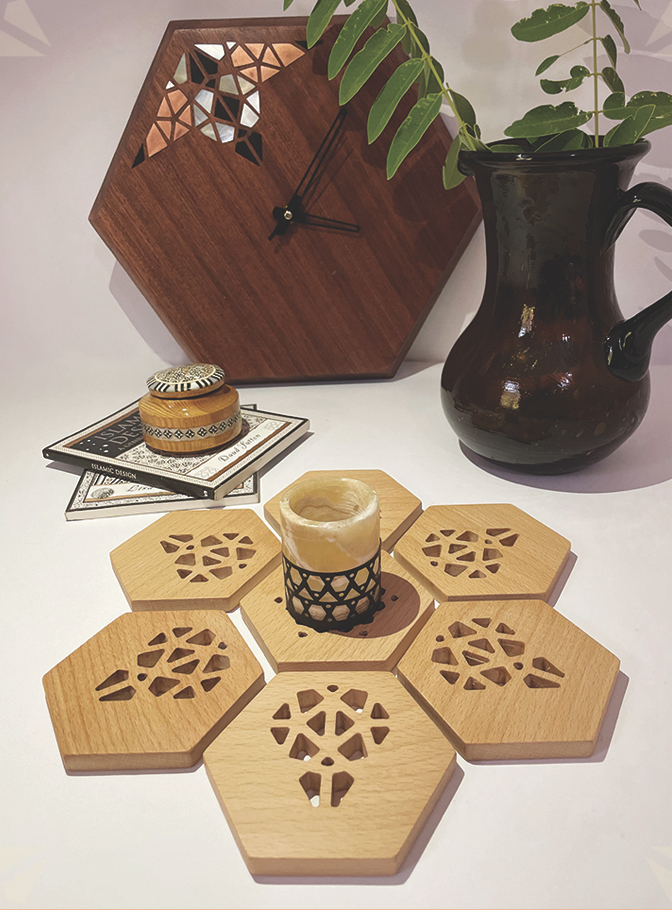 Ali joined a scholarship program held in Cairo by The Prince’s School of Traditional Arts in London, learning the ways of Arabic art by applying it on different materials. After completing the two-year program, she founded her studio in 2020, with an innovative approach aimed at revisiting the arabesque. “The dearest to my heart is the neo-Islamic side table, which was my graduation project,” she recalls. “Even before launching our page people were asking for it.”
Ali joined a scholarship program held in Cairo by The Prince’s School of Traditional Arts in London, learning the ways of Arabic art by applying it on different materials. After completing the two-year program, she founded her studio in 2020, with an innovative approach aimed at revisiting the arabesque. “The dearest to my heart is the neo-Islamic side table, which was my graduation project,” she recalls. “Even before launching our page people were asking for it.”
-41acb70f-1fd2-42a1-9f7a-f890420b7d54.jpg) Aside from the wood, it’s the mother of pearl inlay that makes these pieces special, with its natural, dreamy colours. “When I’m using it, I can never tell what its final colour will be,” Ali says of the natural inlay that makes every piece unique, but it isn’t alone in doing so. Sometimes, it’s the design that makes their products stand out. Like when an advertising company asked for giveaways that were attention grabbing and the designer thought of having a bit of fun. “We thought of board games and ‘XO’ came up,” she explains. “We customized it with inlaid brass, and surprisingly have been getting non-stop requests for games ever since.”
Aside from the wood, it’s the mother of pearl inlay that makes these pieces special, with its natural, dreamy colours. “When I’m using it, I can never tell what its final colour will be,” Ali says of the natural inlay that makes every piece unique, but it isn’t alone in doing so. Sometimes, it’s the design that makes their products stand out. Like when an advertising company asked for giveaways that were attention grabbing and the designer thought of having a bit of fun. “We thought of board games and ‘XO’ came up,” she explains. “We customized it with inlaid brass, and surprisingly have been getting non-stop requests for games ever since.”
-e55fc056-2020-4f0a-a742-990849ce3d13.jpeg) Despite the light-hearted approach, these inspired products have stories of dedication embedded in their carves, and send out a message that this form of art isn’t only still alive but is being revived into the modern world with smart designs that keep its identity intact. “It takes us time to produce them because a lot of effort is put in the design,” she continues. “We are currently focused on exporting, as many friends from abroad have been calling for our products.”
Despite the light-hearted approach, these inspired products have stories of dedication embedded in their carves, and send out a message that this form of art isn’t only still alive but is being revived into the modern world with smart designs that keep its identity intact. “It takes us time to produce them because a lot of effort is put in the design,” she continues. “We are currently focused on exporting, as many friends from abroad have been calling for our products.”
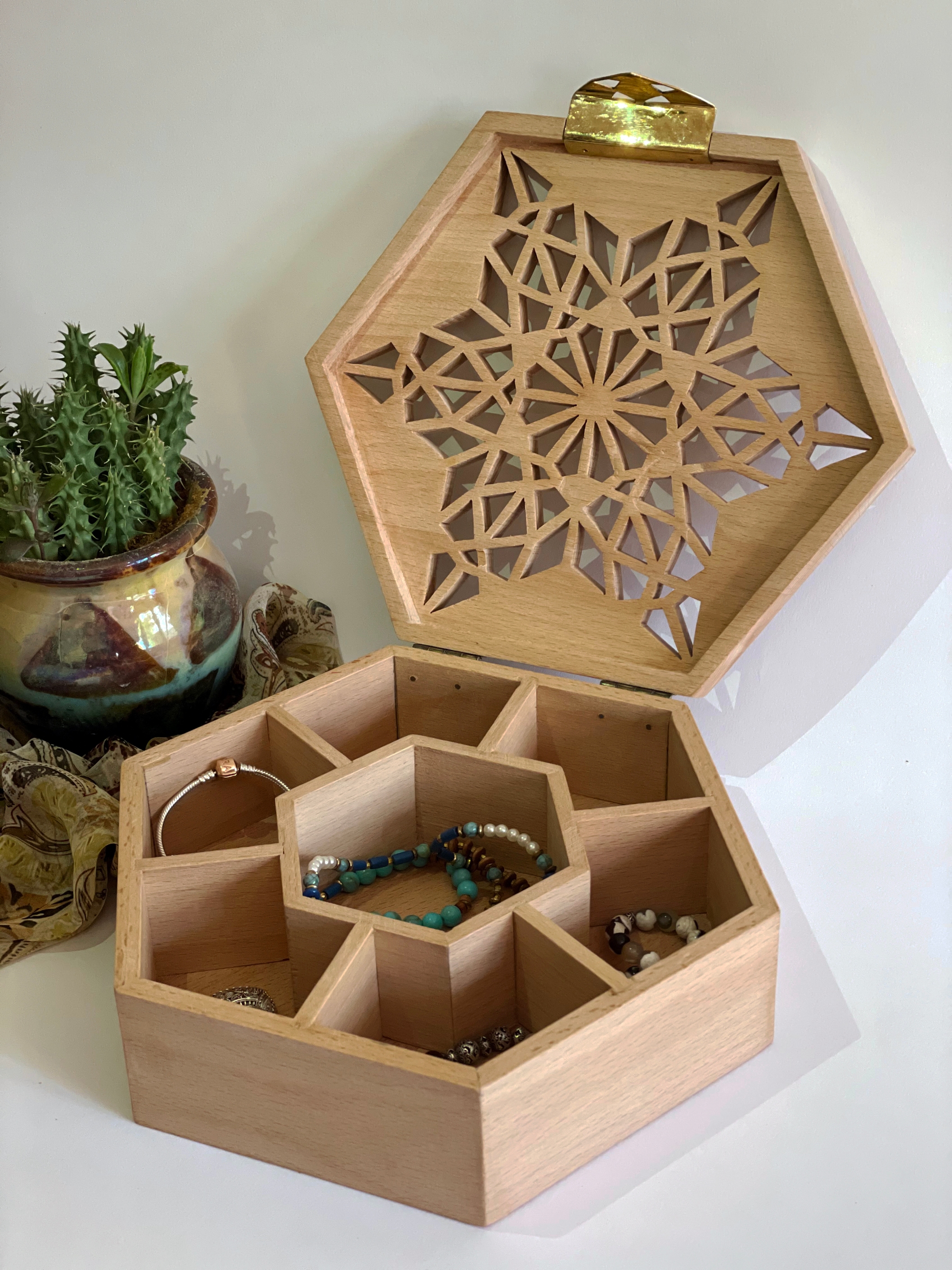 Aiming to reach not only audiences that have an affinity for heritage art, but also those who appreciate the added substance handmade crafts bring to homes, Ali is planning to expand her studio’s product portfolio with to include lighting fixtures that will present the chance to experiment with even more materials.
Aiming to reach not only audiences that have an affinity for heritage art, but also those who appreciate the added substance handmade crafts bring to homes, Ali is planning to expand her studio’s product portfolio with to include lighting fixtures that will present the chance to experiment with even more materials.
- Previous Article The Enduring Charm of Jeddah’s Old Town of Al Balad
- Next Article Capturing Egypt's Design Boom with Photographer Nour El Refai




